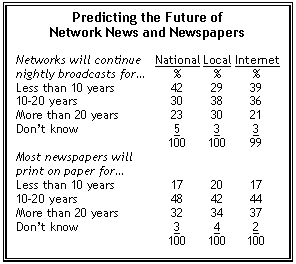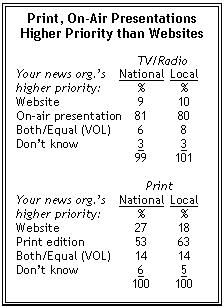Journalists express generally positive opinions about technology-driven changes in news production and delivery. By and large, they are most positive about the changes that give a reader or viewer more news choices and input, but that do not compromise the journalist’s role as the key provider and interpreter of news. Indeed, most journalists still see themselves in the role of news gatekeeper, and they think that it is good for society for them to continue playing this role.

Solid majorities of national and local journalists — in print as well as TV and radio — say that journalists still serve as the gatekeepers of news and information. Even most internet journalists (58%) say that traditional journalists have kept their role as news gatekeepers.
Among those who believe that journalists still retain their role as gatekeeper, the overwhelming majority — more than 90% of each group — says it is a good thing for society that they continue filling that role. However, the minority that believes journalists have lost their gatekeeper role are more divided over the implications of this change.
Overall, 39% of internet news professionals say that traditional journalists have lost their role as gatekeepers for news and information. Internet journalists who express this view are evenly split over whether this is good for society or bad for society (20% good vs. 18% bad). In addition, a third of local print journalists say journalists no longer are gatekeepers; local print journalists who say this also are divided over whether this is a positive or negative development.

The Web and Journalistic Values
Fewer than half of internet (49%), national (41%) and local journalists (34%) say that the rise of the internet will strengthen journalistic values. Those who say the rise of the internet will strengthen values mention the openness and transparency of the internet, as well as the public’s ability to weigh in on the quality of the news, both on the news outlet’s website and other places online. Others say that in the wide-open internet, a trusted news brand will do well. Still others note that the Web allows journalists to tell stories more completely than they can in a more traditional format.

Those who say the rise of the internet will weaken traditional journalistic values point to the pressure to get material up quickly, perhaps too quickly. They worry that the time pressure — driven in part by the need to produce content for both the traditional medium and the Web — lowers the quality of reporting and editing, including fact checking. Others worry about the difficulty of determining the veracity of much online coverage with which traditional news organizations much compete. Some do not think their online competitors hold themselves to high standards.
Future of Network TV, Newspapers

Journalists express mixed views about the future of two traditional news mainstays — network news broadcasts and printed newspapers. In general, the outlook is more negative for nightly network news broadcasts than for printed newspapers.
Roughly four-in-ten national (42%) and internet journalists (39%), and 29% of local journalists, say they expect the three nightly network news broadcasts will survive for another 10 years or less. Still, more journalists in each category expect the broadcasts to endure for 10 to 20 years, or even longer.
About one-in-five national, local and internet journalists believe that printed newspapers will be around for another decade or less. A plurality in each group says newspapers will be printed on paper for another 10 to 20 years. A third or more in each say that printed newspapers will survive for more than 20 years.
National and local print journalists are more bullish about the prospects for printed newspapers than are their TV and radio counterparts. Just 11% of national print journalists, and 9% of local print journalists, say that printed newspapers will be around for only 10 years or less. That compares with 25% of national TV and radio journalists and 30% of local TV journalists.
Managing the Transition to the Web
Most journalists believe their news organization’s leaders have done a good job in managing the transition to the internet. Majorities of national (65%), local (63%) and internet journalists (54%) rate the performance of their news organization’s executives as good or excellent in this regard.
Despite industry concerns about the future of print newspapers and traditional newscasts, most journalists working for traditional media outlets say they continue to spend most of their work hours putting out the paper or preparing the newscast, rather than working on content for their news outlet’s websites. However, most do report that they spend at least some of their time producing unique content for news websites, and the amount of time varies widely by news medium.

A sizable minority of national print journalists (26%) says they spend half or more of their time producing unique content for their organization’s website. That compares with 9% of national TV and radio journalists and just 6% of the local journalists surveyed. As expected, most internet journalists (60%) spend the bulk of their time producing unique web content.
Most journalists do not believe that dividing their time across different media is eroding the quality of their work. In fact, large majorities of both national and local journalists say dividing their time either makes their work better or has had no effect on the quality of their work. Even among national print journalists, who spend a relatively high proportion of their time producing web content, 45% say dividing time across media has improved the quality of their work; 38% say it has made no difference; while just 18% believe it has made their work worse.
TV, Print Still a Higher Priority

Even as news organizations increase the quantity and diversity of content on their websites, most journalists say the traditional medium, and not the website, is the priority where they work.
The vast majority of national and local TV and radio journalists say that the on-air presentation is the top priority at their news organizations (81% national, 80% local). Smaller majorities of print journalists say that the print edition is more important than the website at their news outlets. Nearly two-thirds of local print journalists (63%) — but only about half of national print journalists (53%) — say that the print edition is the higher priority at their news organization.




